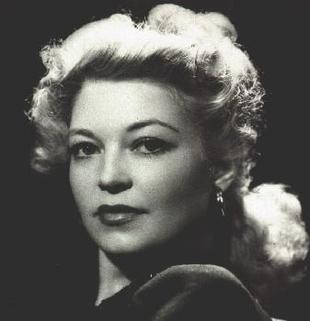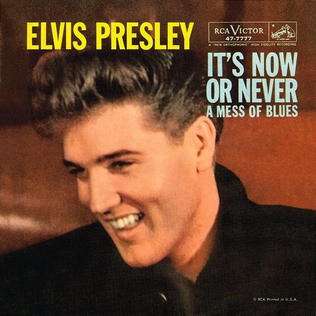
Cindy Walker was an American songwriter, as well as a country music singer and dancer. She wrote many popular and enduring songs recorded by many artists.

"Kentucky Rain" is a 1970 song written by Eddie Rabbitt and Dick Heard and recorded by Elvis Presley. It was recorded at American Sound Studio and features then session pianist Ronnie Milsap. Other musicians on the record include Bobby Wood on piano, Bobby Emmons on organ, Reggie Young on guitar, Tommy Cogbill on bass and Gene Chrisman on drums. The song and session was produced by Felton Jarvis and Chips Moman. It was certified Gold by the RIAA, signifying United States sales of more than a million copies.
"Blue Moon" is a popular song written by Richard Rodgers and Lorenz Hart in 1934 that has become a standard ballad. Early recordings included those by Connee Boswell and by Al Bowlly in 1935. The song was a hit twice in 1949, with successful recordings in the U.S. by Billy Eckstine and Mel Tormé.
"Dark Moon" is a song written by Ned Miller, which was popularized in several different musical formats after its composition. The more popular versions of the song were recorded by Bonnie Guitar and Gale Storm.

"Are You Lonesome Tonight?" is a song written by Roy Turk and Lou Handman in 1926. It was recorded several times in 1927, first by Charles Hart, but also with successful versions by Vaughn De Leath, Henry Burr, and the duet of Jerry Macy and John Ryan. In 1950, the Blue Barron Orchestra version reached the top twenty on Billboard's Pop Singles chart.
This is a list of notable events in country music that took place in the year 1954.
"Love Letters" is a 1945 popular song with lyrics by Edward Heyman and music by Victor Young. The song appeared, without lyrics, in the film of the same name released in October 1945. A vocal version by Dick Haymes, arranged and conducted by Young, was recorded in March 1945 and peaked in popularity in September. "Love Letters" was subsequently nominated for the Academy Award for Best Original Song in 1945, but lost to "It Might as Well Be Spring" from State Fair.
"Have I Told You Lately That I Love You?" is a popular song written by Scotty Wiseman for the 1944 musical film, Sing, Neighbor, Sing and performed by Lulu Belle and Scotty. It was their greatest hit and one of the first country music songs to attract major attention in the pop music field. Although the song was featured in the movie, it was not released by Lulu Belle and Scotty until 1947. The first released version of this song was by Gene Autry in 1945.

"Stuck on You" was Elvis Presley's first hit single after his two-year stint in the US Army, reaching number one in 1960 in the US.

William Neal Browder is an American country music singer, known professionally as T. G. Sheppard. He had 14 number-one hits on the US country charts between 1974 and 1986, including eight consecutive number ones between 1980 and 1982.

"Wooden Heart" is a pop song recorded by Elvis Presley. The composition is based on a German folk song "Muss i denn" and it was featured in the 1960 Elvis Presley film G.I. Blues. The song was a hit single for Presley in the UK Singles Chart, reaching No. 1 for six weeks in March and April 1961.
"There'll Be Peace in the Valley for Me", also known informally as "Peace in the Valley" is a 1939 song written by Thomas A. Dorsey, originally for Mahalia Jackson. In 1951, a version of the song by Red Foley and the Sunshine Boys was a hit, and among the first gospel recordings to sell one million copies. Elvis Presley performed the song at the close of his third and final appearance on The Ed Sullivan Show, which reached 54.6 million viewers. The song has become one of the ten best-known gospel standards of all time, and has been performed and recorded by numerous artists.

"Moody Blue" is a song made famous by Elvis Presley. The song was written and originally recorded by Mark James in 1975 on the Mercury label, with the B side "Wrong Kind Of Love". James previously penned Elvis' "Suspicious Minds" and other songs.
"(Now and Then There's) A Fool Such as I" is a popular song written by Bill Trader and published in 1952. Recorded as a single by Hank Snow it peaked at number four on the US country charts early in 1953.

"It's Now or Never" is a song recorded by Elvis Presley and released as a single in 1960. The song is one of the best-selling singles by Presley, and one of the best-selling physical singles of all time. It was recorded by Bill Porter at RCA Studio B in Nashville. It is written in E major and has a tempo of 80 BPM.

"Paralyzed" is a 1956 song recorded by Elvis Presley for his album Elvis. The song was recorded on September 1, 1956, and has been well received by music critics. The song was written by Otis Blackwell, with Elvis receiving a songwriting credit.
"The Cattle Call" is a song written and recorded in 1934 by American songwriter and musician Tex Owens. The melody was adapted from Bruno Rudzinksi's 1928 recording "Pawel Walc". It later became a signature song for Eddy Arnold. Members of the Western Writers of America chose it as one of the Top 100 Western songs of all time.

"Are You Sincere" is a song written by Wayne Walker, originally released in 1957. Andy Williams recorded the song, which Cadence Records issued as a single in 1958, with an orchestra conducted by Archie Bleyer. Since Williams' success, the song has been covered many times in pop and country styles. Notable covers include versions by: The Platters (1959), Eddy Arnold (1961), Gene McDaniels (1961), Marty Robbins (1961), Lenny Welch (1963), Trini Lopez (1965), Ray Anthony (1968), Bobby Vinton (1969), Brook Benton (1970), Jean Shepard (1973), Elvis Presley (1973), Mel Tillis (1979), Charley Pride (1986),

The singles discography of Elvis Presley began in 1954 with the release of his first commercial single, "That's All Right". Following his regional success with Sun Records, Presley was signed to RCA Victor on November 20, 1955. Presley's first single with RCA, "Heartbreak Hotel", was a worldwide hit, reaching the No. 1 position in four countries and the top 10 in many other countries. Other hit singles from the 1950s include "I Want You, I Need You, I Love You", "Don't Be Cruel", "Hound Dog", "Love Me Tender", "Too Much", "All Shook Up", "(Let Me Be Your) Teddy Bear", "Jailhouse Rock", "Don't", "Wear My Ring Around Your Neck", "Hard Headed Woman", "One Night", "(Now & Then There's) A Fool Such as I", and "A Big Hunk o' Love". On March 24, 1958, Presley entered the United States Army at Memphis, Tennessee, and was stationed in Germany. He left active duty on March 5, 1960.

"Separate Ways" is a 1972 song by Elvis Presley written by Red West and Richard Mainegra. Elvis Presley recorded the song on March 27, 1972, and released it as a single with "Always On My Mind" as the B-side. It reached gold status in the US for sales of over half a million copies. It was listed as a double sided hit reaching #16 on Billboard magazine's Hot Country Singles chart in November 1972. In the UK "Always On My Mind" was the hit song and "Separate Ways" was the B-side.











